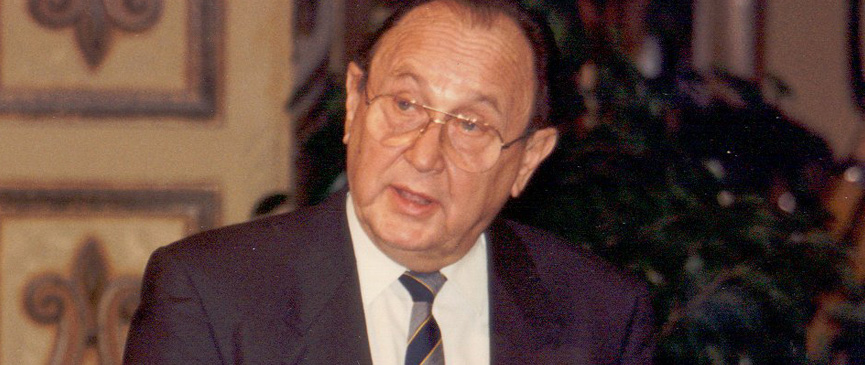The Princess of Asturias Foundation
Sección de idiomas
Fin de la sección de idiomas
Sección de utilidades
Fin de la sección de utilidades
- The Foundation
- HM The King
- HRH The Princess of Asturias
- 2023 Special
- Princess of Asturias Awards
- Area of Communication and Media
- Music Department
- Exemplary Town of Asturias Award
- 2012 Special
- 2013 Special
- 2014 Special
- 2015 Special
- 2016 Special
- 2017 Special
- 2018 Special
- 2019 Special
- 2020 Special
- 2021 Special
- 2022 Special
-
Important: COVID-19
-
Terms of Use
You are in:
Laureates
Start of main content
Hans Dietrich Genscher
Prince of Asturias Award for International Cooperation 1990

Hans Dietrich Genscher (Reideburg, Germany, 1927 - Wachtberg, Germany, 2016) was Minister of Foreign Affairs of the Federal Republic of Germany for 18 years, being one of the most veteran Western politicians, a constant promoter of ways to bring together the nations that make up the European continent and a prominent mediator in the process of German reunification.
Born in Reideburg, near Halle, on 21st March 1927, he completed his studies in Law and Economics in 1949, in the then German Democratic Republic (GDR). From his early days as a student, he was a member of the German Liberal-Democratic Party and belonged to the Evangelical Church. He moved to the Federal Republic of Germany in 1952 and began work as a lawyer in a company in Bremen in 1954.
He also joined the Liberal Party in 1952, being named Vice President of the Young Democrats of Bremen a few months later. Two years after that, he began work as a scientific adviser to this party’s parliamentary group until being appointed executive secretary of the parliamentary group in 1959. He left this post in 1965 on being named whip for that same group. He was named Vice President of the Party in 1968.
A year later, in 1969, he joined Willy Brandt’s cabinet as Federal Minister of Interior Affairs. In May 1974, following the inauguration of Helmut Schmidt as Federal Chancellor, he was appointed Minister of Foreign Affairs and Vice Chancellor of the Federal Republic of Germany. He was elected President of the Liberal Party in 1974.
In September 1982, following a crisis in the Liberal-Democratic coalition government, the four Liberal ministers, with Genscher at the head, resigned. Genscher then led an accord with the Christian Democratic Party headed by Helmut Kohl which led to a vote of no confidence against Schmidt. Having won the vote, a centre-right government coalition was formed, in which Genscher was named Minister for Foreign Affairs. In February 1985, he took over the presidency of the Liberal Party from Martin Bangemann. Minister of Foreign Affairs from 1974 to 1992 and member of the federal parliament from 1965 to 1998, Hans Dietrich Genscher assumed the inheritance of “Ostpolitik” initiated by Willy Brandt, based on rapprochement with Eastern countries. Genscher expressed his support for the disarmament proposals formulated by Mikhail Gorbachev on numerous occasions, and was also in favour of the ban on chemical weapons.
Often afflicted with illnesses due to his demanding level of activity, he was nevertheless known for his inexhaustible capacity for work and willingness to travel. He was awarded an honorary degree by the University of Salamanca in March 1986.
In May 1992, at his own request, he stood down from office as Minister of Foreign Affairs and Vice Chancellor of the Federal Republic of Germany.
End of main content
Sección de utilidades
Fin de la sección de utilidades
- Legal document Legal document (Access key 8)
- | Privacy policy Privacy policy (Access key )
- | Social networks ???en.portal.pie.menu107.title???
- | Cookies ???en.portal.pie.menu110.title???
- | Site map Site Map (Access key 3)
- | Contact Contact (Access key )
- | XHTML 1.0
- | CSS 2.1
- | WAI 'AA
© Copyright 2024. FUNDACIÓN PRINCESA DE ASTURIAS



